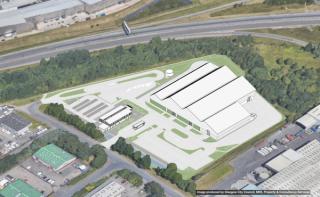
SLR experts published by Table.Media on responsible supply chains for critical raw minerals
Read more

SLR was delighted to hear about the confirmation of funding for Glasgow City Council (GCC) to build a new materials recovery facility (MRF) at Easter Queens lie. Over the last 18 months, SLR has supported GCC with the development of this project.
In the summer of 2021, SLR was commissioned to complete the identification and assessment of an option on the future of the existing Blochairn MRF. This plant is over 12 years old, and its performance has deteriorated in recent years. Therefore, significant reinvestment would be necessary to improve recyclate processing and recovery, policy changes such as DRS and EPR, and changes to waste collection from comingled to a 'twin bin' system.
During this work, we compared six options for GCC, including business-as-usual operation and variations of upgrading and developing a new MRF designed to process waste collected in a twin bin system. The twin bin system allows source separation of 2D waste, which mainly consists of paper, card and plastic film, from 3D waste, consisting of tins, cans, plastic bottles and plastic containers.
The option of a new twin stream MRF was found to be the best option, and SLR's team then started work supporting the development of that option. A new or upgraded MRF, along with a twin bin collection system, presents GCC with a significant opportunity to increase its recycling rates and reduce costs and carbon impact.
GCC selected EQ as their preferred site for the new development. SLR's engineers visited to understand the challenges and opportunities presented at the site. SLR then arranged for two visits to new MRFs in Scotland. The first was the Cireco plant near Dunfermline, and the second was the Suez plant in Aberdeen.
This was agreed to be a valuable venture for the SLR and GCC team to understand how MRF technology has moved on since Blochairn was built. We remain extremely grateful to John White at Cireco and Colin Forshaw at Suez for facilitating the visits to their plants. Following the visits, SLR developed its own concept design for the Easter Queenslie MRF.
As part of the works, SLR worked closely with GCC's Architectural team to develop layout drawings, process flow diagrams, employer's requirements, as well as sizing of the MRF and WTS buildings. Ultimately, this work was critical in securing internal and external funding through the Recycling Improvement Fund (RIF). To support their RIF bid, SLR assisted the GCC team in developing the following:
While understanding the costs of the project was critical, the carbon model was an essential tool for illustrating the importance this new plant could be compared to BAU. SLR modelled carbon savings as up to 20 tonnes of CO2 equivalent when the facility reaches its designed capacity of 50,000 tpa.
These savings will be achieved by improvements to source segregation of recyclable material in Glasgow and to the quality of outputs recovered from the MRF. The move to a twin bin system has been shown to reduce contamination in other local authority areas, and the same is expected at the new EQ MRF.
The separation of 2D material (paper and card) from 3D material (metals and various plastics) allows the MRF operator to programme their process for optimal recovery of materials which have similar physical properties.
For example, at Blochairn, incoming recyclables are currently a mix of 2D + 3D material. One of the first steps is to separate the 2D and 3D materials into separate streams by employing pre-sorting and ballistic separators.
Pickers remove contaminants that could compromise the plant's availability, while ballistic separators allow materials that have a high surface area to volume ratio (2D) optical to rise to the top of a series of oscillating paddles, while 3D material falls to the bottom of the unit. The optical separators then target the expected individual component, like plastic bottles or paper.
No separation process is perfect, so some 2D material ends up in the 3D stream and vice versa. Material that has migrated to the incorrect stream does not get recycled as it is not targeted as an output.
The new plant will be able to run in 2D or 3D modes depending on processing requirements and will be able to switch from one stream to another in a matter of minutes. This switch will include changes to the optical sorters programming to automatically target different materials for recovery.
Believing everything will be perfect when the new collection scheme is first introduced is naïve. Contamination is an inevitability with municipal recycling, so the new plant will allow for the extraction of non-readable material to send to landfill/ EfW.
Critically, it will also allow for the extraction of the 'wrong' recyclable stream. For example, if the 2D stream contains some plastic, this can be extracted and given a 'second chance' to be recycled the next time the plant processes 3D material.
These, and other improvements, mean that GCC can recover up to 95% of the recyclates collected, which is a significant increase from the current recovery rate of 39%. In fact, the GCC and SLR teams expect this project will allow for a notable improvement in Scotland's recycling rate.
Now, the segregation of recycling streams and how these are processed might not be the hottest topic for most people. However, the SLR team are genuinely excited about the improvement this project will have and are proud of the work we could do up to this stage. We wish GCC best wishes with the continuation of the project and hope we can work together in the future.
Written by Euan Munro and Jack Rooney


